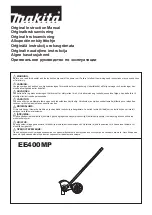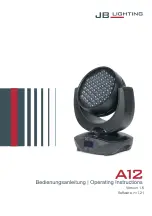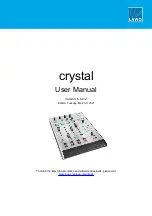
3
Controlling StudioLive RM-series Mixers
3.9
Internal Effects Mixes
StudioLive
™
CS18AI
Owner’s Manual
67
Delay and its Parameters
A delay essentially creates an echo, although you can often use
delays to create more complex time-based effects. The source signal
is delayed so that it is heard later than it actually occurred.
Note:
Delay types and presets can only be loaded on FX C and FX D.
The following parameters are available for the four delay types the StudioLive offers:
Time. This is the time (in milliseconds) between the source signal and its
echo. The simplest delay effect is a single repeat. A short delay between
30 and 100 ms can be used to create slap-back echo, while longer delay
times produce a more distant echo. Delay times that are too short to
hear as distinct echoes can be used to create thickening effects. Whether
these echoes are timed with the tempo is a matter of stylistic choice.
This is the parameter that is controlled by the Tap Tempo button. Using the
Tap button on the CS18AI, you can speed up or slow down these repeats or,
more commonly, time the repeats to occur with the tempo of the music.
Power User Tip:
While you have to select the Time parameter in order to use the Tap
button, you only have to do this the first time you use the Tap button for that effect.
Once the Tap button has been used to control the Time parameter on FX buses C or D,
it will always control the time of that particular delay, no matter what page you are
currently viewing. To assign the Tap button to control another delay, simply navigate
to that delay’s Time parameter and use the button to enter the desired delay time.
Time X. Time X is the value of the beat you are using as a reference for the
tempo. The basic unit of measure is a quarter note, so for example, if the
beats you are tapping represent quarter notes in the music, you would
set Time X to 1.00. If they are eighth notes, you would set Time X to 0.50,
half notes would be set to 2.00, and so on. In this way, you can precisely
synchronize or syncopate the delay echoes to the music in real time.
Note:
The Stereo Delay offers two Time X controls. With the Ping
Pong delay, the Pong X parameter serves the same purpose.
Variable Feedback. Variable feedback, or regeneration, produces multiple
decaying repeats. Increasing the feedback value increases the number of echoes,
as well as the resonance that is created as one echo disappears into another.
F_Frequency. Sets the center frequency in Hz for the Filter Delay.
F_Gain. Sets the boost at the center frequency for the Filter Delay.
F_Q. Sets the Q for the Filter Delay. The Q is the ratio of the center frequency to
the bandwidth. When the center frequency is constant, the bandwidth is inversely
proportional to the Q, so as you raise the Q, you narrow the bandwidth.
Summary of Contents for StudioLive CS18AI
Page 4: ......
















































